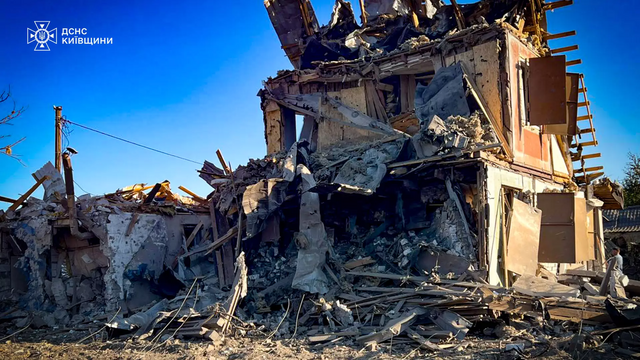Russia unleashed one of its largest aerial offensives in months against Ukraine, targeting critical energy infrastructure across the country and leaving at least five dead. The overnight barrage struck major cities, from Odesa and Dnipro to Rivne in the west, and forced residents of Kyiv to take shelter in the city's metro stations.
Ukrainian officials reported extensive damage. Two people were killed in a drone strike in Mykolaiv, with six others injured, including two children. In Odesa, two more lives were lost, while a 17-year-old boy was wounded. Another victim, a woman, was killed in Lviv while inside her vehicle, according to the regional governor. The strikes triggered blackouts in several areas, notably in Odesa, where heating, water, and electricity supplies have been disrupted, with hospitals relying on backup generators.
"This is war criminal Putin's true response to all those who called and visited him recently," Ukrainian Foreign Minister Andrii Sybiha stated on X, a likely reference to Russian President Vladimir Putin's recent phone call with German Chancellor Olaf Scholz. Sybiha added, "We need peace through strength, not appeasement."
The scope of the attack was significant, with Ukrainian President Volodymyr Zelensky reporting approximately 120 missiles and 90 drones fired by Russia. Ukrainian defense forces managed to intercept over 140 aerial targets, but many still caused damage. "The enemy's target was our energy infrastructure across Ukraine," Zelensky said. "Unfortunately, some facilities sustained damage from direct hits and falling debris." Efforts to restore power in affected regions are underway, he added.
Russia's Ministry of Defense confirmed the attack, stating on Telegram that it involved "high-precision long-range air and sea-based weapons and strike drones" aimed at energy targets. This marks the third-largest assault on Ukraine's grid this year and highlights Moscow's continued strategy of targeting critical infrastructure as winter approaches.
The strikes come at a pivotal moment in the war, as Russia reportedly makes gains along key frontlines in eastern and southeastern Ukraine. Moscow claims to have captured two settlements in Donetsk, though Ukrainian officials have not confirmed this. Meanwhile, Russian forces are also preparing for a counteroffensive in the Kursk region. "This operation to systematically dismantle terrorist infrastructure in the area will continue as long as required to achieve its objectives," stated the Israel Defense Forces (IDF).
Germany's Scholz defended his recent communication with Putin, describing it as "important" but acknowledging that little had changed in the Russian leader's stance on the conflict. The conversation was the first direct contact between the two leaders in over two years. Scholz emphasized that European leaders should not be excluded from diplomatic efforts with Moscow, especially amid speculation about renewed U.S. negotiations under a new administration.
In a chilling reminder of the stakes, Ukraine's energy sector bore the brunt of the attack. Ukrainian energy company DTEK reported severe damage to its thermal power plants. As temperatures drop, millions risk losing access to heating and electricity, exacerbating the humanitarian crisis. Emergency shutdowns were imposed in Kyiv and other regions to stabilize the grid.
The impact of Russia's renewed assault is felt beyond Ukraine. Poland scrambled fighter jets to protect its airspace following the missile barrage, highlighting concerns over regional security. The strikes also prompted responses from Ukrainian allies, who condemned Moscow's attempts to destabilize the energy grid and target civilians.
As the war enters its third winter, Ukraine braces for further challenges. "We need to prepare for everything," Zelensky said in an interview with Radio Ukraine. He warned of continued strikes through the winter months as Russia seeks to maximize its leverage. The ongoing conflict underscores the fragility of potential diplomatic efforts and the devastating human cost of war.




